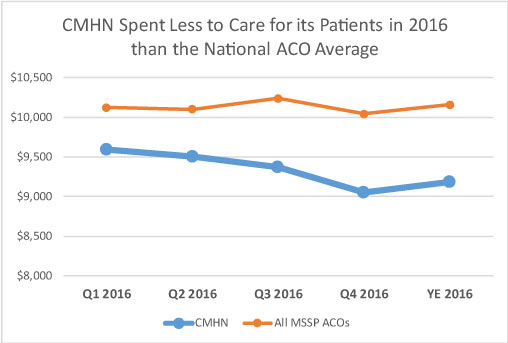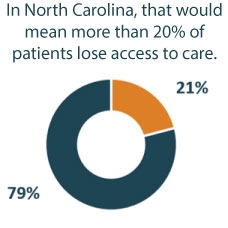FOR IMMEDIATE RELEASE: January 10, 2017
NC MEDICAL SOCIETY, NC COMMUNITY HEALTH CENTER ASSOCIATION AND CENTENE CORP. COME TOGETHER TO OFFER UNIQUE APPROACH TO MEDICAID REFORM IN NORTH CAROLINA
For more information, contact:E. Benjamin Money, Jr. MPH
President & CEO
North Carolina Community Health Center Association
(919) 469-1116 (direct)
moneyb@ncchca.org
Elaine A. Ellis
Director of Communication and Marketing
North Carolina Medical Society
(919) 833-3836
eellis@ncmedsoc.org
RALEIGH – The North Carolina Medical Society (NCMS), working in conjunction with the North Carolina Community Health Center Association (NCCHCA), and Centene Corporation (NYSE: CNC) today announced they have signed a definitive agreement to collaborate on a patient-focused approach to Medicaid under the reform plan enacted in the state of North Carolina.
Under the agreement, the organization will create a joint venture, Carolina Complete Health, to establish, organize and operate a physician-led health plan to provide Medicaid managed care services in North Carolina. A key feature of the joint venture wihll be the active participation of physicians in the ownership and governance of the health plan. Centene will manage the financial and daily operations, while the Carolina Complete Health Network, which will be owned jointly by NCMS, physicians, Physician Assistants, Nurse Practitioners and Federally Qualified Health Centers, will provide medical management services, hold a majority on the Board of Directors and oversee the medical policies for the health plan.
“With the changes taking place in our health care system at the state level with Medicaid reform and new programs at the national level, the NCMS remains committed to ensuring that physicians are the ones making the clinical decisions in the best interest of their patients,” said NCMS CEO Robert W. Seligson. “Our leadership views this partnership as a unique opportunity to help lead the reform process and to put patients’ needs first.”
When the General Assembly in September 2015 passed Medicaid reform legislation privatizing the state’s Medicaid program, the NCMS began to proactively pursue opportunities to keep patients at the forefront. The NCMS established key criteria for a partnership including financial strength, experience with statewide Medicaid networks and an openness to a patient-focused approach.
“Centene is pleased to enter into this partnership with the NCMS and NCCHCA to serve Medicaid recipients in North Carolina,” said Michael F. Neidorff, Chairman, President and CEO for Centene. “We believe this physician-directed health plan can be an ideal model when properly executed to ensure providers are leading health care decisions and contributing toward a value-based reimbursement system that results in better health outcomes for members at a lower cost to the state. We have seen this type of health plan model work, and we look forward to bringing this approach to North Carolina.”
Moving forward, the NCCHCA will serve as an integral part in making the joint venture a success.
“North Carolina Federally Qualified Health Centers (FQHCs) are key providers of primary care services to Medicaid recipients across North Carolina. The patient-centered medical home model at FQHCs, and their focus on providing a broad spectrum of services to low-income and underserved populations, make them uniquely prepared to meet the state’s Medicaid reform goals. NCCHCA believes partnering with the North Carolina Medical Society and Centene will enable FQHCs to work more closely with physician specialists and health systems in their local communities to improve patient continuity of care, quality and cost,” said NCCHCA CEO E. Benjamin Money, Jr.
###
About the North Carolina Medical Society (NCMS)
The NCMS is the oldest professional member organization in North Carolina, representing physicians and physician assistants who practice in the state. Founded in 1849, the Society seeks to promote access to quality health care for all citizens in North Carolina and champions initiatives that seek to improve quality of care and promote patient safety.
About the North Carolina Community Health Center Association (NCCHCA)
The NCCHCA is a private, non-profit membership association that represents federally-qualified health centers and aspiring health centers across North Carolina. The NCCHCA’s mission is to promote and support these patient-governed community health care organizations and the populations they serve.
About Centene Corporation
Centene Corporation, a Fortune 500 company, is a diversified, multi-national healthcare enterprise that provides a portfolio of services to government sponsored healthcare programs, focusing on under-insured and uninsured individuals. Many receive benefits provided under Medicaid, including the State Children’s Health Insurance Program (CHIP), as well as Aged, Blind or Disabled (ABD), Foster Care and Long Term Care (LTC), in addition to other state-sponsored programs, Medicare (including the Medicare prescription drug benefit commonly known as “Part D”), as well as programs with the U.S. Department of Defense and U.S. Department of Veterans Affairs. Centene operates local health plans and offers a range of health insurance solutions. It also contracts with other healthcare and commercial organizations to provide specialty services including behavioral health management, care management software, correctional healthcare services, dental benefits management, in-home health services, life and health management, managed vision, pharmacy benefits management, specialty pharmacy and telehealth services.
Centene uses its investor relations website to publish important information about the Company, including information that may be deemed material to investors. Financial and other information about Centene is routinely posted and is accessible on Centene’s investor relations website, http://www.centene.com/investors.
NCMS is “testing the waters” under Regulation A under the Securities Act of 1933, as amended, to gauge market demand from potential investors for an offering of securities by its wholly-owned subsidiary (the “issuer”) formed in connection with the contemplated joint venture between NCMS and Centene. No money or other consideration is being solicited, and if sent in response, will not be accepted. No offer to buy the securities can be accepted and no part of the purchase price can be received until an offering statement is filed with, and qualified by, the Securities and Exchange Commission. Any such offer may be withdrawn or revoked, without obligation or commitment of any kind, at any time before notice of its acceptance given after the qualification date. A person’s indication of interest involves no obligation or commitment of any kind.
This communication contains forward-looking statements. In some cases, you can identify these statements by forward-looking words such as “believe,” “may,” “will,” “estimate,” “continue,” “anticipate,” “intend,” “could,” “would,” “project,” “plan,” “expect” or the negative or plural of these words or similar expressions. These forward-looking statements include, but are not limited to, statements concerning the joint venture, the proposed health plan and our projections. You should not rely upon forward-looking statements as predictions of future events. These forward-looking statements are subject to a number of risks, uncertainties and assumptions, including, among other things, satisfaction of the conditions to closing of the joint venture transaction. In light of these risks, uncertainties and assumptions, the forward-looking events and circumstances discussed in this communication may not occur and actual results could differ materially and adversely from those anticipated or implied in the forward-looking statements. Except as required by law, neither Centene, NCMS, the issuer, NCCHCA nor any other person assumes responsibility for the accuracy and completeness of the forward-looking statements. Centene, NCMS, the issuer and NCCHCA undertake no obligation to update publicly any forward-looking statements for any reason after the date of this communication to conform these statements to actual results or to changes in our expectations.




